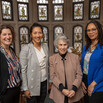The War on Cancer at 50

A groundbreaking book co-edited by Abbe R. Gluck ’00, Alfred M. Rankin Professor of Law and Faculty Director of the Solomon Center for Health Law and Policy, and Dr. Charles Fuchs, former Director of the Yale Cancer Center and Physician-in-Chief of Smilow Cancer Hospital, offers an unprecedented look into the politics, policy, regulation, and science of cancer. The book, A New Deal for Cancer: Lessons from a 50 Year War (PublicAffairs, Nov. 16) arrives as the nation prepares to mark the 50th anniversary of the National Cancer Act of 1971 — widely seen as the start of the “war on cancer.”

A New Deal for Cancer begins with President Richard Nixon’s signing of the National Cancer Act of 1971 into law, on Dec. 23, 1971. As the book details, the Act empowered the National Cancer Institute, significantly increased funding for cancer research and charted the course ahead. But while major progress has been made in intervening decades, much about cancer was misunderstood in 1971 and critical work still lies ahead.
The book builds off a 2018 conference held at Yale Law School, “The Policy, Politics & Law of Cancer,” co-sponsored by the Solomon Center and the Yale Cancer Center — the largest cancer conference in Connecticut history. Bringing together leading figures in the worlds of cancer care, research, regulation, and policymaking — including Harold Varmus, Nobel Laureate and former head of the NIH and NCI, as well as current NCI Director Ned Sharpless and others — the two-day conference offered a major assessment of current cancer policy. Speakers examined a range of cutting-edge topics, including the role Washington, D.C. plays in cancer research and treatment, special challenges in drug development and pricing, and how disparities and inequalities impact cancer research, regulation, and treatment. A New Deal for Cancer expands on each of these and other issues across its chapters.
“The book seeks to fill a void we realized many were eager to fill,” said Gluck, who is also Professor of Internal Medicine at Yale School of Medicine, “to go beyond the science to the structures, economics, laws, inequities, politics, and policies that sometimes enable, and other times impede, progress in the war on cancer.” The book, Gluck added, “is unprecedented in its range, and could not have a more brilliant and expert cast of contributors.”
“The past 50 years have witnessed a profound improvement in our understanding of the biology and treatment of cancer. Advances in new targeted therapies and cancer immunotherapy have revolutionized our ability to improve the lives of patients. Nonetheless, this is not a time to declare victory,” said Fuchs, who is now Senior Vice President and Global Head of Product Development for Oncology and Hematology at Roche and Genentech. “Too many patients progress or fail to respond to available treatments. Leveraging the achievements and new technologies over the past 15 years, we need to further expand the universe of novel therapeutic approaches. No less importantly, we need to ensure that access to these advances are available to all patients, particularly under-represented or underserved populations.”
Arriving at a critical moment, A New Deal for Cancer boasts a number of contributing authors from across Yale University, including Cary Gross, Professor of Medicine and Public Health and Director of the National Clinician Scholars Program; Melinda Irwin, Susan Dwight Bliss Professor of Epidemiology and Associate Director at the Yale Cancer Center; Linda M. Niccolai, Professor in the Department of Epidemiology of Microbial Diseases; Abigail Friedman, Associate Professor of Public Health; and Nicole Deziel, Associate Professor of Epidemiology and Associate Professor of Environment, among others.
Yale Law School student and alumni contributors to the book include Arjun Mody ’20, Matt K. Nguyen ’19, Allison Rabkin Golden ’21, and Eugene Rusyn ’17.
“This book lays out in clear terms how the past 50 years has shaped where we are today yet also charts a path forward,” Irwin said. “While cancer mortality rates are 30 percent lower than the peak in the 1990s, to see continued improvements, we must invest in public health approaches to preventing cancer, improving access to care, and closing the cancer health disparities gap. We do this, then we drastically reduce cancer mortality rates.”
“The chain of discovery set in motion by the National Cancer Act has yielded foundational breakthroughs in our understanding of cancer and how to preventing and treat it,” said Gross. “We are truly moving the needle towards lower cancer death rates at the population level. Yet this 50-year mark also provides an opportunity to reflect on our approach, and envision how we can better align scientific, political, medical, and business interests to prioritize patients and the public. There are abundant opportunities to accomplish this vision, and our hope is that this book can help chart the path.”
The Solomon Center has been at the forefront of legal institutions focused on cancer, and also recently expanded its Medical Legal Partnership offerings to include legal services for oncology patients. Taken together, these efforts seek to undo another legacy of the past half century. The legal, political, regulatory, and policy obstacles against — and levers for — fighting cancer have often been overlooked in public discussions about the future of cancer in America. As a collection of multidisciplinary contributions by some of the most important figures in their field, A New Deal for Cancer represents the ongoing work of the Solomon Center, Smilow Cancer Hospital, and Yale Cancer Center to fill this gap.
The book’s release will be accompanied by events at Yale — including a virtual launch event on Dec. 7, 2021 from 12 p.m. to 1 p.m., as well as other cancer centers and organizations across the country.


